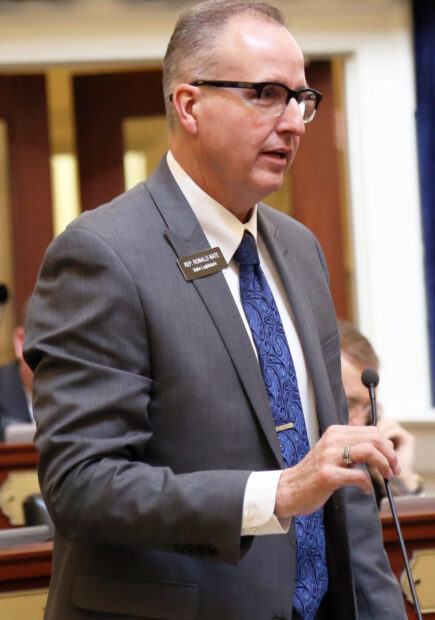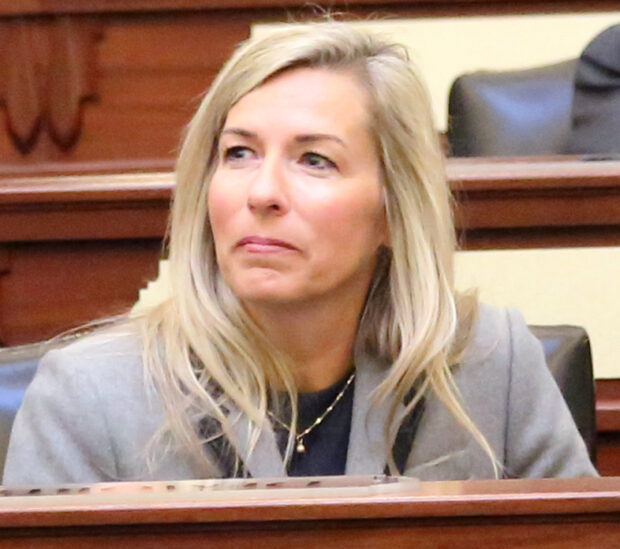
Rep. Ron Nate won the House Education Committee’s blessing to introduce a new bill Wednesday that encourages schools to create gun safety courses.
Nate, R-Rexburg, pitched the program as a gun safety measure.
Two committee Democrats questioned the bill. In the end, the lone dissenting vote came from Rep. John McCrostie, D-Garden City, a teacher.
Nate’s bill would not allow the use or presence of live ammunition in schools.
“Safety and prevention are always a priority,” Nate said. “In an era where gun ownership is increasing, we do see in the news more and more cases of active shooter situations and incidental accidents with firearms. It is a responsibility of ours to educate children as best we can for firearms and firearm safety.”
Nate’s bill states “trustees may adopt an elective course of instruction developed by the Department of Fish and Game, a law enforcement agency or a firearms association as its firearms safety education course.”
Retired teacher and Rep. Dorothy Moon, R-Stanley, enthusiastically supported the proposal. She said many students in her district participate in biathlon and enjoy it when Fish and Game officers bring in BB guns for training.
“This is getting back to making sure there is an emphasis on this, especially in our rural communities for students who want to participate,” Moon said.
Rep. Hy Kloc, D-Boise, wondered why firearms safety courses are needed in schools.
“What is this going to fix?” Kloc asked. “Is this a solution to something that is not being done now.”
Nate said it would be easier to reach more students by offering the program in schools.
Under questioning, Nate told McCrostie that he did not consult with the State Board of Education before drafting the bill. Instead, Nate said he “mentioned it briefly ”to Superintendent of Public Instruction Sherri Ybarra, and he said she did not appear to have a problem with the legislation. Ybarra did not attend Wednesday’s hearing, and her office did not offer an official position on the bill.
The bill’s statement of purpose says districts would not be required to offer firearms safety courses. Nate also maintains that passage of the bill would not cost the state money because “the new course, like other elective courses, may be offered within existing resources for the schools.”
Introducing the bill clears the way for it to return to House Education for a full hearing. Legislators are working to adjourn the session later this month, and face a Monday deadline to pass bills out of their respective legislative chambers. That deadline likely means Nate’s bill would need to clear the House quickly this week for it to have a chance to reach the Senate.
Tax credits for private schools
Rep. John Vander Woude is making another attempt to set up a tax credit to support private schools.
Vander Woude, R-Nampa, says his bill could free up money from the state’s general fund budget to help at-risk students pursue options outside the traditional public school system.
“It’s not a reflection on the education system,” Vander Woude told the House Revenue and Taxation Committee. “Sometimes it’s just an environment.”
Similar proposals have run into resistance at the Statehouse in past years, and have divided education groups and school choice advocates.

Under Vander Woude’s latest proposal, donors would be able to receive an 80 percent tax credit for donations to a scholarship fund. The tax credits would cap at $15 million a year.
However, Vander Woude says the bill would be a net positive for the state’s budget — mainly because the state would no longer have to cover the costs of teaching children who use scholarships to attend private schools. The bill’s fiscal note pegs the possible cost savings to the state at $11.8 million, but concedes that the estimate “depends on many unknown variables.”
Under questioning from the committee, Vander Woude said he had not vetted his latest bill with Attorney General Lawrence Wasden’s office, but he said Wasden had signed off on a “very similar” bill in the past.
Revenue and Taxation voted to introduce the tax credit bill Wednesday morning, setting the stage for a full hearing later in the session.
Charter school authorization
In other action Wednesday, Rep. Gayann DeMordaunt, pushed a new bill she said is aimed at streamlining the process for creating new charter schools.

DeMordaunt is a Republican from Eagle and school choice advocate. She has previously served on the Idaho Charter School Commission and was a founder of North Star Charter School.
DeMordaunt said many requirements for opening new charter schools are duplicative, burdensome and confusing. Her bill is 16 pages and would delete six pages of existing state law found under the section of code addressing petitions to establish public charter schools.
“This bill would do several things (including) creating a uniform application for new charter schools,” DeMordaunt said.
House Education members voted unanimously to introduce the bill with very little discussion of its details.
Introducing the bill clears the way for it to return to House Education for a full hearing.
Making up snow days
There may be relief on the way for school districts worrying they will have to cut into summer break to make up snow days.
Rep. Judy Boyle, R-Midvale, and the State Board of Education are pushing a new bill that would allow school districts to request a waiver from the state’s minimum instructional hours requirements. Under the new bill, districts would only be able to seek the waiver when the entire district is affected by unforeseen natural occurrences — such as extreme, sustained snowstorms — and a county or state emergency declaration has been made.
State Board of Education spokesman Blake Youde said heavy snow this winter in Boyle’s and other legislative districts unexpectedly forced the closure of school for an extended period of time. Those closures leave officials faced with extending classes “potentially going into late June or July,” to make up for cancelled classes, Youde said.
The bill stipulates any district seeking a waiver from minimum instructional hours requirements must describe the efforts it made to make up the lost instruction time.
Introducing the bill clears the way for it to return to House Education for a full hearing. The bill includes an emergency clause, which would make it effective immediately upon its passage into law. Bills without an emergency clause don’t become effective until July 1, so this new bill could apply to this school year if signed into law.
Idaho Education News reporter Kevin Richert contributed to this report.
